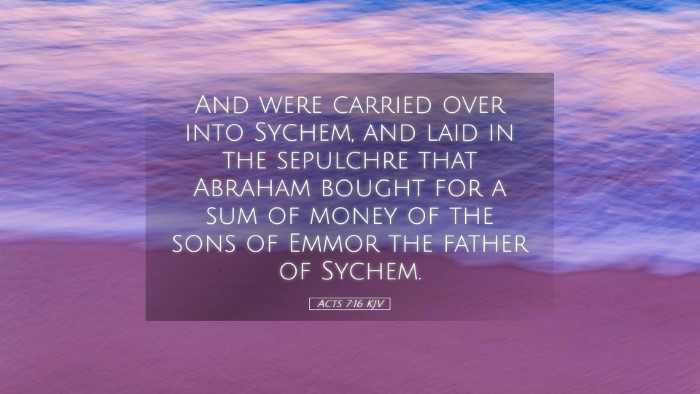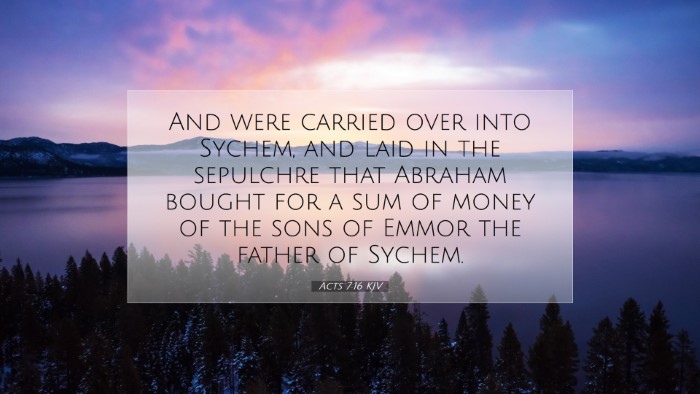Acts 7:16 Commentary
The verse Acts 7:16 states: "And were carried over into Sychem, and laid in the sepulchre that Abraham bought for a sum of money of the sons of Emmor the father of Sychem." This verse articulates a historical moment during which the bodies of the patriarchs were integrated into the narrative of Israel's heritage. The implications of this verse stretch beyond mere historical recounting; it serves as a profound reflection on covenantal promises and the land's sanctity.
Contextual Analysis
In understanding this verse, it is crucial to recognize its placement within Stephen's speech before the Sanhedrin. Stephen recounts Israel’s history to draw attention to God's consistent faithfulness and to highlight the people's recurrent resistance to divine providence.
Historical Background
Matthew Henry, in his commentary, emphasizes the significance of the burial at Sychem (Shechem), noting that it represents a tangible part of the covenant God made with Abraham regarding land. This region is central to Israel's identity and the unfolding of the Abrahamic covenant and eventually the promises to Isaac and Jacob.
Covenantal Significance
Albert Barnes expands on this notion by illustrating that the acquisitions of land by Abraham were not merely transactions for property; they embodied God's assurance of future possession for his descendants. He notes that this act of purchasing a burial plot signified faith in God's promise of the land even in the face of current realities where the land was not yet under their control. This faith is foundational for understanding Israel's eventual possession of Canaan and highlights the spiritual truth that the faithful often dwell on promises yet fulfilled.
Lessons for Believers
The theological implications of this verse resonate well beyond its historical narrative.
- Faith in Promises: Just as Abraham trusted God’s promises despite not possessing the land, believers are called to trust in God's timing for the fulfillment of His promises in their lives.
- Consecration of Land: The purchased grave signifies that the land is a divinely appointed place. Similarly, believers can consecrate their spaces, acknowledging that their claims and possessions are granted by God.
- Unity of Purpose: The burial of patriarchs in a specific location underscores the unity of God’s plan for His people and how each member of the faith community plays a role in the unfolding of divine history.
Spiritual Parallels
Adam Clarke draws a parallel between the burial of the patriarchs and the promise of resurrection and eternal life. The sepulchre, even though it signifies death, should also be viewed through the lens of hope. This imagery resonates with believers who see death as a transition to eternal communion with God. Clarke’s interpretation encourages readers to view the end of earthly life not as an end, but as a continuation of God’s plan.
Character of God
This passage reinforces the faithfulness of God. Time and again, He creates opportunities for His people to reflect on His work and trust in His purposes. The fathers of the faith resting in the land bought with a price also emphasizes that God's work must culminate in Christ, who paid the ultimate price for humanity’s redemption.
Conclusion
Acts 7:16 serves as a reminder of God’s promises and faithfulness through generations. It challenges us to be vigilant in our trust of God’s plans, even when they seem distant. For the pastor, theologian, or scholar, this verse is a hermeneutical touchstone for considering how God's narrative interweaves with the unfolding story of humanity, faith, and divine promise.


